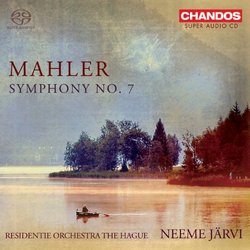| All Artists: Mahler, Residentie Orch the Hague, Jarvi Title: Symphony 7 Members Wishing: 0 Total Copies: 0 Label: Chandos Original Release Date: 1/1/2010 Re-Release Date: 7/27/2010 Album Type: Hybrid SACD - DSD Genre: Classical Style: Number of Discs: 1 SwapaCD Credits: 1 UPC: 095115507926 |
Search - Mahler, Residentie Orch the Hague, Jarvi :: Symphony 7
 | Mahler, Residentie Orch the Hague, Jarvi Symphony 7 Genre: Classical
|
Larger Image |
CD Details |
CD ReviewsVery good, for such a radical departure B. Guerrero | 07/31/2010 (4 out of 5 stars) "Make no mistake, this is about as radical of a departure from the norm as one could possibly make - a departure that goes in the complete opposite direction from Klemperer's bizarrely slow account of Mahler 7. A quick comparison of timings will tell you that these are probably THE fastest performances of the two Nachtmusik movements ever captured on tape (Mvts. II & IV). Yet, put all together, this performance does work on a certain level; as long as one is completely willing to eschew any, "Song Of The Night" narrative - a title bestowed upon the symphony by someone other than Mahler (it wasn't Bruno Walter). Instead, Jarvi treats the first four movements as a unified arch that behaves as a prelude to the finale. The finale, in turn, acts as a symphony within a symphony. As long as the listener is able to except Jarvi's approach on its own terms (more a "concerto for orchestra" than yet another traversal from darkness to light), much enjoyment can be extracted. For the most part, the playing is superb, as are Chandos' sonics.
From the very start, Jarvi's introductory section in the first movement is much quicker than normal. No doubt, he's actually cheating the value of the long notes across Mahler's Baroque-like, double-dotted rhythms. Yet, the main Allegro passage is hardly taken any faster than usual. Instead, it's some of the slower passages that are picked up a bit from their norm. It's an unusual approach but it works. The second movement (first Nachtmusik) is probably the biggest problem here, as it's taken much quicker than usual - more a quick stroll in broad daylight than a careful "Nightwatch" trek through the brambles and thistles. Yet, it's so well played that it somehow doesn't bother me. Still, I can see how others could be offended - that much I won't duck from. The Scherzo is pretty much normal, and it has now become customary to take the second Nachtmusik (Mvt. IV) at a quicker pace than it used to played - thus making for a better transition into the blinding sunlight of the finale. And while Jarvi has probably managed to set some of kind land speed record with his 2nd Nachtmusik - clocking in a bit less than 10 minutes - he still manages to provide sufficient contrast between the various subsections. In other words, it doesn't sound mechanical or too stiff - just fast! Jarvi's finale differs only in that he starts out his opening fanfare slower than usual, then picks up speed as this so-called Rondo finale progresses (it's more a musical potpourri with everything but the kitchen sink thrown in!). Many conductors and orchestras sort of tire along the way, and manage to lose steam toward end. Not Jarvi, and a strong volley of deep bells and chimes help to make the ending more joyous than usual. By all means, this can not be recommended as your one and only recording of Mahler 7 - leave that to Bernstein, Abbado, early Haitink, etc. But as a supplement that's a radical departure from norm . . . hey, at least it's really well played and recorded! " |

 Track Listings (5) - Disc #1
Track Listings (5) - Disc #1